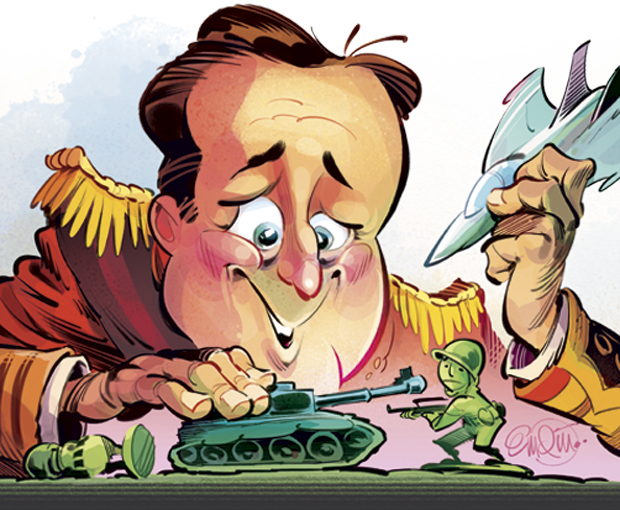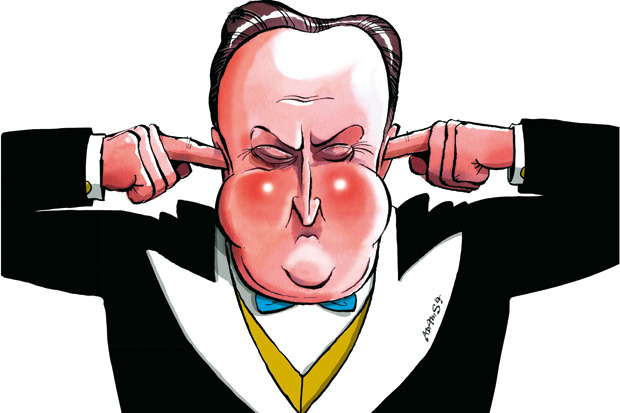What is the one consolation for an MP who has beaten all their colleagues to the top job? It can hardly be the luxury of having your life, circle and income open to alternate snorts of envy and derision. Nor can it be the quagmire into which nearly all attempts to solve the nation’s domestic problems now fall. Only one thing allows prime ministers of a country such as Britain to feel they have power. That is exercising it. And nothing exercises power more than deciding which wars to fight.
In opposition, David Cameron did not much like the idea of war, and derided his colleagues for their admiration of Tony Blair. Yet in office — as Syria is revealing — he is treading a very similar path. We are told that he is phoning the White House to discuss Syria and hoping to put steel into Barack Obama’s spine, just as Blair did with Bill Clinton over Bosnia. Cameron is doing so not because he emulates Blair, but rather because it is the path almost any leader would take at this point in our history.
The global axis of world power is turning. Obama’s America is retreating from international leadership. China and Russia are resurgent and happy to prove it. Despite our diminished resources and influence, the best shot at seriousness any British leader can have is still to bestride the world stage. And they can do so at a knock-down price. Blair was delighted to discover that the UK still ‘punched above its weight’ and that he could behave like a world leader even while slowly decimating our armed forces. Cameron is cutting the military still further, yet seems just as eager to deploy forces soon to be smaller than at any time since the pre-Napoleonic era.
In his leading of the charge in Libya and now in Syria, Cameron is demonstrating a recognisable desire to do something with his office: to say that Britain is a force for good — a nation that likes to shape the world rather than be shaped by it. It is a noble impulse. And it is understandable that he should seek to rise above the impossibility of his domestic role by confronting tyrants. Whether it is wise is, of course, another matter.
When Tony Blair was preparing to become prime minister he expected his legacy to be domestic. But then everybody always does. Nobody climbs their party hierarchy by harping on about changing the outside world. When the Princeton academic Woodrow Wilson was elected president of America, he mused that ‘it would be the irony of fate if my administration had to deal chiefly with foreign affairs’. This was January 1913. Few leaders have much choice in the matter.
In opposition, Cameron was not interested in war. When he had to talk about foreign affairs he chose to decry the alleged hubris of Blair’s foreign interventions. ‘I am a liberal conservative, rather than a neo-conservative,’ he said. ‘Bombs and missiles are bad ambassadors. They win no hearts and minds; they can build no democracies.’ But he was no more in favour of action closer to the ground. His priorities were underlined by his spending decisions after he was elected: the military budget was cut while the foreign aid budget soared by a third.
Yet this is the same Prime Minister who persuaded close colleagues of the need to intervene to prevent Colonel Gaddafi massacring the citizens of Benghazi when they rose up. The same Prime Minister is now leading the international charge against the Assad regime in Syria. And the preferred method he is now advocating is deploying those very same ‘bombs and missiles’ which he now seems to have found some faith in.
To understand Cameron’s journey, one must consider Tony Blair’s much-scrutinised but little-understood premiership. For Blair the important moment was not Iraq or Afghanistan but Kosovo. There were two epiphanies about that conflict in particular that are worth understanding. The first was that the use of targeted strikes against the forces of Slobodan Milosevic succeeded in preventing any further ethnic cleansing of the Kosovar Albanians. Thus military force — which was connected in Blair’s generation of lefties with brute, evil imperialism — was revealed as capable of being a force for good. Military force could be progressive; it could relieve human suffering.
The second part of Blair’s Kosovo epiphany was the more intoxicating. Britain had succeeded in taking part in the coalition against Milosevic (and helped lead it) without losing a single British life. The same was not true with Afghanistan, which turned into more than a decade of largely failed state-building. Iraq, which both Washington and London expected to be a swift and clinical regime ‘decapitation’, turned into a bloody and sectarian mess. And one which is ongoing: 520 Iraqis died last month alone.
So Kosovo turned out to be an exception. But it stuck with Blair. It was after Kosovo (incidentally, not approved by the UN and thus an ‘illegal war’) that he was riding high on the world stage. It was visiting those people he saved that he was at his most popular. Libya was similar for Cameron. Nobody was lost on the side Cameron ordered into battle. And it was in Tripoli and Benghazi that he and President Sarkozy were treated as liberators, statesmen and saviours.
If Blair’s conversion happened over years, Cameron’s took days. The week before the Libya campaign he was in Egypt and once again trotted out his line that he was ‘not a naive neocon who thinks you can drop democracy out of an aeroplane at 40,000 feet’. In fact there was no time to decide whether to send the Royal Navy’s Tomahawk missiles into Tripoli; Gaddafi was preparing to rout the rebels in Benghazi and there were only a few hours to implement a no-fly zone. This was the moment when Cameron himself grew up and, like Blair before him, learned to love the precision-guided bomb.
We saw the newly hawkish Cameron again in January, when Islamic terrorists seized a BP gas plant in Algeria. The Algerian government responded without consulting him, to his undisguised dismay. But in his speech to the Commons, Cameron sounded very much the war leader. ‘We are in the midst of a generational struggle against an ideology which is an extreme distortion of the Islamic faith,’ he declared. It is far from clear that Barack Obama agrees. That same day, in his second inaugural address, the President told Americans that ‘a decade of war is now ending’.
So Britain finds itself once again in the position where a prime minister is urging an American president to act. If Cameron has an advantage in this it is that he has become Prime Minister in an era where nearly everyone is an interventionist. It may be strange, considering the course of the Afghan and Iraq wars, but politicians and public of left and right now routinely express the desire that Britain should act. Just as once it was the pictures of Milosevic’s victims, or Saddam’s or Gaddafi’s, now the impetus comes from photos of the residents of a Syrian suburb shelled with chemical weapons. The pictures come out and the same cry goes up. Even Samantha Cameron, fresh from visiting Syrian refugees in Lebanon, is apparently of the same mind: ‘something must be done’, ‘you can’t just stand there’. What is a prime minister to do in such a situation?
Many, primarily on the left, will say that anything and everything must be done to relieve the appalling human suffering. But such voices should come with a health warning. They are the first to fall away once the inevitable consequences of ‘something’ occur. When the first school or hospital is accidentally struck by a precision-guided bomb the ‘something must be done’ brigade are the first warriors to retreat even from their own armchairs. It is a similar tale on the slightly less interventionist right. Once the story turns — once there are atrocities which can be put down to ‘us’ and not ‘them’ or British casualties actually pile up, the calculus always shifts. But the person who has ordered action — the Blair or the Cameron — is left holding the thing.
As readers of Charles Moore’s biography of Margaret Thatcher will know, this is the most isolating moment of leadership. It will be what the PM will be weighing up now. If Tomahawk missiles are aimed at Syria, then what next? Might Britain end up being sucked into an ethnic conflict? Perhaps he was lucky in Libya. Had the Gaddafi regime held on for much longer, British stockpiles of the necessary munitions — already seriously depleted and not replaced — would have run dry.
Whatever he decides, he must recognise that the problem of Syria is both like other cases and wholly different. The repercussions of many interventions in recent years suggest that there are three golden rules. Never get involved unless you are clear on your objective. Never pursue that objective unless you are willing to go in far further if needed. And finally, be prepared to lose everything.
At present there is no clear objective in Syria. Everyone deplores the regime’s use of weapons — chemical and conventional. Sending a few missiles as a slap on the wrist could be weak and ineffectual. Toppling Assad is an option. But to what end? He is certainly bad, but the alternatives look even worse. Anybody can spot plenty of ‘bad guys’ in the Syrian civil war. It is finding the ‘good’ ones that is tricky. In addition, we have neither the desire nor the capability to own the country if our actions break it. There is no appetite to go further than dropping liberty from 10,000 feet. Given the quality of Syrian air defences, is Cameron willing to lose pilots this time? Or be dragged further in if a post-Assad Syria makes post-Saddam Iraq look like a cakewalk?
The diplomatic questions are just as ugly as the military ones. Is he willing to stand up to Russia and China? Is he willing to accept that the UN Security Council will not approve any action and that he will thus be ordering (ridiculous term) an ‘illegal war’? If he proceeds regardless, and things go badly wrong, is he willing — as Blair turned out to be — to stake his whole political career on a bloody and benighted country he barely knows?
One military chief recently pointed out in private that everybody — the military included — makes their own problems. The military thought Libya couldn’t be done on available resources. The PM overrode their objections and was proved right. As the military source pointed out, that may mean the PM is less willing to listen to the military next time. He went on: ‘I fear that it will take another debacle — another Suez-style debacle — for British politicians to learn how far they have stretched the military.’ Of course ‘next time’ is now ‘this time’.
And that is the really vital thing about power that any leader ought to know. Not just when to exercise it. But when to refrain from doing so.
Got something to add? Join the discussion and comment below.
Get 10 issues for just $10
Subscribe to The Spectator Australia today for the next 10 magazine issues, plus full online access, for just $10.
You might disagree with half of it, but you’ll enjoy reading all of it. Try your first month for free, then just $2 a week for the remainder of your first year.















Comments
Don't miss out
Join the conversation with other Spectator Australia readers. Subscribe to leave a comment.
SUBSCRIBEAlready a subscriber? Log in